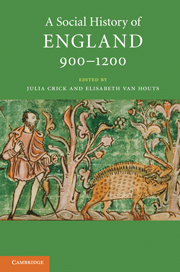Book contents
- Frontmatter
- Contents
- List of figures
- List of maps and tables
- List of contributors
- Acknowledgements
- List of abbreviations
- Map 1 England and its neighbours
- Map 2 England 900–1200
- I Introduction
- I.1 Land use and people
- I.2 Water and land
- I.3 Forest and upland
- I.4 Mineral resources
- I.5 Health and disease
- II.1 Authority and community
- II.2 Lordship and labour
- II.3 Order and justice
- II.4 War and violence
- II.5 Family, marriage, kinship
- II.6 Poor and powerless
- III.1 Towns and their hinterlands
- III.2 Commerce and markets
- III.3 Urban planning
- III.4 Urban populations and associations
- IV.1 Invasion and migration
- IV.2 Ethnicity and acculturation
- IV.3 Intermarriage
- IV.4 The Jews
- V.1 Religion and belief
- V.2 Rites of passage and pastoral care
- V.3 Saints and cults
- V.4 Public spectacle
- V.5 Textual communities (Latin)
- V.6 Textual communities (vernacular)
- VI.1 Learning and training
- VI.2 Information and its retrieval
- VI.3 Esoteric knowledge
- VI.4 Medical practice and theory
- VI.5 Subversion
- Glossary
- Time line 900–1200
- Further reading
- Index
- References
VI.3 - Esoteric knowledge
Published online by Cambridge University Press: 05 June 2012
- Frontmatter
- Contents
- List of figures
- List of maps and tables
- List of contributors
- Acknowledgements
- List of abbreviations
- Map 1 England and its neighbours
- Map 2 England 900–1200
- I Introduction
- I.1 Land use and people
- I.2 Water and land
- I.3 Forest and upland
- I.4 Mineral resources
- I.5 Health and disease
- II.1 Authority and community
- II.2 Lordship and labour
- II.3 Order and justice
- II.4 War and violence
- II.5 Family, marriage, kinship
- II.6 Poor and powerless
- III.1 Towns and their hinterlands
- III.2 Commerce and markets
- III.3 Urban planning
- III.4 Urban populations and associations
- IV.1 Invasion and migration
- IV.2 Ethnicity and acculturation
- IV.3 Intermarriage
- IV.4 The Jews
- V.1 Religion and belief
- V.2 Rites of passage and pastoral care
- V.3 Saints and cults
- V.4 Public spectacle
- V.5 Textual communities (Latin)
- V.6 Textual communities (vernacular)
- VI.1 Learning and training
- VI.2 Information and its retrieval
- VI.3 Esoteric knowledge
- VI.4 Medical practice and theory
- VI.5 Subversion
- Glossary
- Time line 900–1200
- Further reading
- Index
- References
Summary
The esoteric learning of England before 1200 is enshrined in an extensive manuscript record that, while it exhibits significant losses as a result of Viking depredations and later looting and loss, and if it appears dramatically broken-backed in its relative reflection of Latin and vernacular texts before and after the pivotal reign of King Alfred the Great (871–99), nonetheless demonstrates a consistent and continuing interest in hidden and obscure learning throughout the period. The fact that Aldhelm (who died in 709/10), writing in the late seventh century, should quote from an anonymous treatise on animal noises that also appears in a late-tenth-century manuscript, Cambridge, Trinity College, MS O. 1. 18 (1042), with strong associations with Archbishop Dunstan of Canterbury (who died in 988), is as pertinent in this regard as that Dunstan should also be directly linked with a composite manuscript, Oxford, Bodleian Library, Auctarium F.4.32 (2176), that contains, alongside material in Breton and Welsh, notes on weights and measures in Greek and Latin, a runic alphabet and an extract from Ovid's Ars amatoria (Art of love). The Ars amatoria is otherwise attested (likely second-hand!) by Bede, who died in 735, by Wulfstan of Winchester (who died early in the eleventh century) and by a further manuscript from early England, namely Paris, Bibliothèque Sainte-Geneviève, MS 2410 (a Canterbury manuscript from around the year 1000), which contains two lines alongside an odd catch-all collection of diverse lore (including works by the poets Juvencus, Caelius Sedulius, Odo of Cluny and Alcuin, as well as, for example, a Greek litany and Sanctus, Greek numbers in Latin letters and a poem on the Four Keys of Wisdom) that characterizes the comprehensiveness of early English interests.
- Type
- Chapter
- Information
- A Social History of England, 900–1200 , pp. 381 - 390Publisher: Cambridge University PressPrint publication year: 2011
References
- 1
- Cited by



